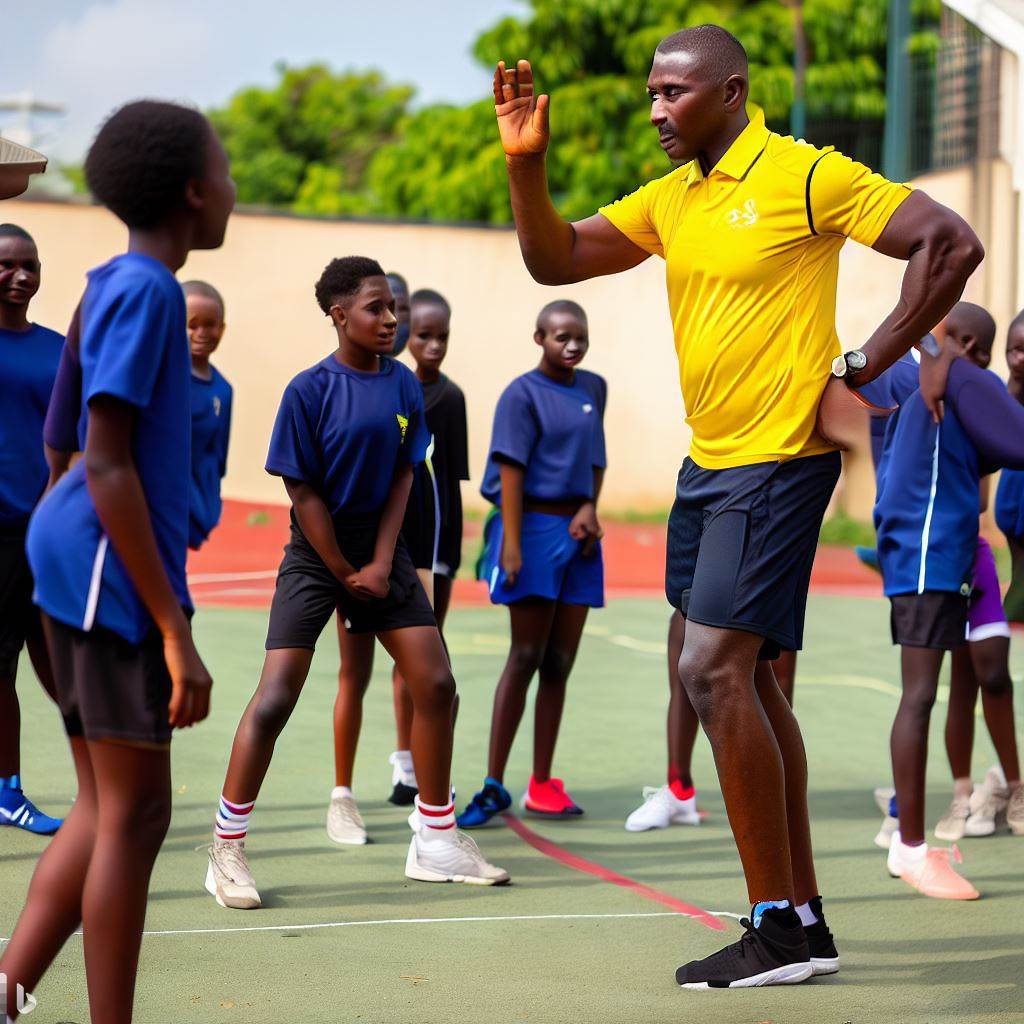Introduction
An athletic trainer plays a vital role in the world of sports, ensuring the health and well-being of athletes.
They are skilled healthcare professionals who specialize in preventing, diagnosing, and treating injuries related to physical activity.
Athletic trainers are crucial in sports as they provide immediate medical attention and care to athletes, helping to minimize the risk of further injury and ensuring a speedy recovery.
They work closely with coaches, athletes, and medical professionals to create and implement injury prevention strategies, rehabilitation programs, and emergency response plans.
Without athletic trainers, the effectiveness and safety of sports would be compromised.
They are responsible for assessing and managing injuries, administering first aid, and providing therapeutic interventions such as taping, bracing, and stretching to athletes.
Moreover, athletic trainers educate athletes about proper nutrition, hydration, and injury prevention techniques to enhance their performance and reduce the likelihood of injuries.
They also collaborate with team physicians and healthcare providers to discuss treatment plans and coordinate the overall healthcare of athletes.
In Nigeria, the importance of athletic trainers is gaining recognition as more sports organizations and teams understand the significant role they play in ensuring the well-being and success of athletes.
From football to athletics, the services of athletic trainers are becoming increasingly valuable in Nigerian sports.
Most importantly, athletic trainers are essential healthcare professionals who provide comprehensive care to athletes, preventing and managing sports-related injuries.
Their expertise and dedication contribute significantly to the overall success and safety of sports, making them invaluable assets in the sporting world.
Job Opportunities for Athletic Trainers in Nigeria
The field of athletic training in Nigeria is experiencing a growing awareness and recognition.
With the rise of sports and sporting events in the country, the demand for athletic trainers has significantly increased.
In various sports organizations such as clubs, teams, and academies, there is a clear need for professional athletic trainers.
These trainers play a crucial role in ensuring the well-being and performance of athletes.
A. Growing Awareness of Athletic Training in Nigeria
- Increased popularity of sports in Nigeria has led to a higher demand for athletic trainers.
- Athletic trainers are now recognized as essential members of sports organizations.
- Awareness campaigns highlighting the benefits of athletic training have contributed to the growth.
B. Demand for Athletic Trainers in Various Sports Organizations
- Football clubs, basketball teams, and other sports organizations require skilled athletic trainers.
- These professionals are responsible for preventing, diagnosing, and treating sports-related injuries.
- Athletic trainers collaborate with coaches, athletes, and medical staff to optimize performance.
C. Potential Career Growth and Advancement Opportunities
- Athletic trainers in Nigeria have the potential for career advancement and growth.
- As the sports industry continues to expand, the demand for skilled trainers will rise.
- Experienced athletic trainers can become head trainers, sports team managers, or even start their own sports clinics.
- Continuous professional development and specialization can lead to better job prospects and higher salaries.
Basically, athletic trainers in Nigeria have ample job opportunities in the growing sports industry.
The increasing awareness of athletic training, coupled with the demand from sports organizations, creates a favorable environment for individuals pursuing this career path.
The potential for career growth and advancement further adds to the attractiveness of becoming an athletic trainer in Nigeria.
Read: Networking for Athletic Trainers in Nigeria: Tips and Groups
Salary and Compensation
When considering a career in athletic training in Nigeria, it is important to understand the salary and compensation prospects.
Here, we will delve into the salary range, benefits, additional perks provided by sports organizations, and how it compares to other healthcare professions in the country.
A. Salary Range for Athletic Trainers in Nigeria
Athletic trainers in Nigeria can expect a competitive salary that reflects their expertise and dedication.
The salary range for athletic trainers in Nigeria varies depending on factors such as experience, qualifications, and location.
On average, entry-level athletic trainers can earn between 120,000 to 180,000 Nigerian Naira per month.
As they gain more experience and build a strong reputation, this figure can increase significantly.
Experienced athletic trainers in top-level sports organizations or those with advanced certifications can earn anywhere between 300,000 to 500,000 Nigerian Naira per month.
It is worth mentioning that these figures may vary and can be higher or lower depending on the specific sports organization and location within Nigeria.
B. Benefits and Additional Perks Provided by Sports Organizations
In addition to the competitive salary, athletic trainers in Nigeria often enjoy various benefits and additional perks provided by sports organizations.
One of the main benefits is access to comprehensive healthcare coverage.
Sports organizations in Nigeria understand the importance of keeping their trainers healthy and provide medical and dental insurance packages.
Furthermore, athletic trainers may receive paid vacation days, sick leave, and maternity/paternity leave, allowing them to strike a healthy work-life balance.
Some organizations also offer retirement plans and investment opportunities to secure the trainers’ financial future.
Moreover, athletic trainers get the chance to work with elite athletes and be part of their success stories.
This aspect is often regarded as a significant perk for passionate individuals who thrive on witnessing athletes’ achievements firsthand.
C. Earning Potential Comparison with Other Healthcare Professions in Nigeria
The earning potential of athletic trainers in Nigeria is quite impressive when compared to other healthcare professions.
While the average salary of athletic trainers falls within the range of 120,000 to 500,000 Nigerian Naira per month, professions like nursing and pharmacy have an average salary range of approximately 100,000 to 400,000 Nigerian Naira per month.
This puts athletic trainers in a favorable position financially.
Additionally, athletic trainers have the opportunity to earn higher incomes through bonuses, performance incentives, and endorsement deals with sports brands.
This further elevates their earning potential and makes the profession an attractive choice.
It is important to note that the salaries of healthcare professionals, including athletic trainers, in Nigeria may vary depending on the region, level of experience, and the organization they work for.
A career as an athletic trainer in Nigeria offers not only a rewarding experience but also a competitive salary and attractive benefits.
With the chance to work with elite athletes, access comprehensive healthcare coverage, and enjoy additional perks, athletic trainers are well-positioned in the healthcare industry.
Moreover, when comparing the earning potential to other healthcare professions, athletic trainers in Nigeria are financially ahead.
So, if you have a passion for sports and healthcare, becoming an athletic trainer in Nigeria might be the right choice for you.
Read: The Role of PE Teachers in Building Healthy Communities
Enhancing Athlete Performance and Safety
Athletic trainers play a crucial role in improving athlete performance and ensuring their safety.
Through their expertise, they contribute to enhancing athletic performance while reducing the risk of injuries.
A. Improving Performance and Reducing Injuries
Athletic trainers have in-depth knowledge of the human body and how it functions during physical activities.
They use this knowledge to create training programs tailored to meet the specific needs of athletes.
By designing individualized workout routines, they help athletes improve their strength, endurance, and overall athletic performance.
Moreover, athletic trainers provide guidance on proper technique and form during exercises to prevent injuries.
They emphasize the importance of maintaining correct posture, using appropriate equipment, and following safety guidelines.
Through continuous monitoring and feedback, trainers ensure athletes avoid common mistakes and maximize their performance potential.
B. Injury Prevention
Athletic trainers play a vital role in preventing injuries among athletes.
They analyze each sports activity, identifying potential risks or movements that may lead to injuries.
With this knowledge, they develop preventive measures and implement strategies to safeguard athletes from harm.
By educating athletes on injury prevention techniques, such as warm-ups, stretching exercises, and the use of protective equipment, athletic trainers create a safer environment for athletes.
They also monitor the playing conditions and facilities to ensure they meet safety standards, minimizing the risk of accidents or hazardous situations.
C. Injury Assessment and Rehabilitation
In the unfortunate event of an injury, athletic trainers are trained to assess the severity and extent of the damage.
Their expertise allows them to quickly determine the appropriate course of action, whether it is immediate medical attention, on-field first aid, or a rehabilitation plan.
Athletic trainers are skilled in providing first aid and initial treatment for injuries, such as sprains, strains, or fractures.
They work closely with medical professionals to devise comprehensive rehabilitation programs that help athletes recover and regain their physical fitness.
Trainers monitor the progress of the rehabilitation process, ensuring athletes follow the prescribed exercises and techniques to facilitate a speedy recovery.
D. Overall Well-being and Health Management
Athletic trainers not only focus on physical performance and injury prevention but also prioritize the overall well-being of athletes.
They provide guidance on nutrition, hydration, and rest, which are crucial elements for peak athletic performance.
Trainers collaborate with athletes to develop personalized training schedules that balance workload and recovery time, minimizing the risk of overtraining or burnout.
They also address mental health concerns, recognizing the psychological impact of injuries and the stress associated with competitive sports.
Through their comprehensive approach to athlete care, athletic trainers act as advocates for athletes’ health and well-being.
They ensure athletes maintain a healthy balance between training, competition, and recovery, enabling them to perform at their best while staying safe.
In general, athletic trainers contribute significantly to enhancing athlete performance and safety.
Their expertise in improving performance, preventing injuries, assessing and rehabilitating injuries, and managing overall athlete health ensures that athletes can excel in their respective sports while minimizing the risk of harm.
The invaluable role of athletic trainers in Nigeria cannot be overstated, as they play a crucial part in the success and well-being of athletes in the country.
Read: Women in Athletic Training in Nigeria: Opportunities and Challenges

Professional Development and Networking
As an athletic trainer in Nigeria, there are numerous professional development opportunities available to enhance your career and stay updated in the field.
Professional development is crucial for personal growth and to provide the best possible care to athletes.
Here are some ways athletic trainers can engage in professional development and networking:
- Continuing Education: Athletic trainers can attend conferences, workshops, and seminars to gain new skills, learn about the latest research, and stay updated on best practices. These educational events provide opportunities to interact with other professionals and exchange knowledge.
- Certifications: Pursuing specialized certifications can improve an athletic trainer’s expertise and open up new career opportunities. Certifications such as Certified Strength and Conditioning Specialist (CSCS) or Certified Athletic Rehabilitation Therapist (CART) demonstrate a higher level of competency and dedication to the profession.
- Workshops and Webinars: Many organizations offer workshops and webinars focused on specific areas of athletic training, such as sports nutrition, injury prevention, or rehabilitation techniques. These events enable athletic trainers to expand their knowledge and skills in targeted areas.
- Professional Associations: Joining professional associations such as the Nigerian Athletic Trainers’ Association (NATA) can provide access to valuable resources, networking opportunities, and mentorship programs. Associations often organize conferences and events exclusively for their members.
- Networking: Networking is crucial for career growth and staying updated with industry trends. Connecting with other athletic trainers, sports medicine professionals, and even athletes allows for knowledge sharing, collaboration, and potential job opportunities.
In summary, professional development and networking are integral for athletic trainers in Nigeria to grow in their careers and provide the best possible care to athletes.
Attending conferences, workshops, and pursuing certifications help broaden knowledge and enhance skills.
Engaging in networking activities and joining professional associations create opportunities for collaboration and staying updated with industry trends.
With a commitment to professional development, athletic trainers in Nigeria can thrive in their roles and contribute to the advancement of sports medicine.
Read: Continuing Education for Athletic Trainers in Nigeria
Personal Satisfaction and Impact
Being an athletic trainer in Nigeria not only provides personal fulfillment but also has a significant impact on athletes’ lives.
By helping athletes achieve their goals, athletic trainers feel a sense of satisfaction and purpose.
A. Fulfillment in Helping Athletes Achieve Goals
One of the most rewarding aspects of being an athletic trainer is witnessing athletes reach their goals.
Whether it’s recovering from an injury or improving their performance, trainers play a vital role in athletes’ success stories.
When an athletic trainer helps an athlete overcome physical limitations and achieve their best performance, it creates a sense of personal satisfaction and pride.
Publish Your Professional Profile, Business or Brand
Showcase your expertise, gain trust, and boost visibility instantly on Professions.ng.
Publish NowThe trainer becomes an integral part of the athlete’s journey, sharing in the joy of their achievements.
B. Impact on Athletes’ Lives
Athletic trainers have a profound impact on athletes’ lives by enabling their participation in sports.
They provide essential medical care and support that ensures athletes stay healthy and perform at their best.
Through their expertise in injury prevention, assessment, and rehabilitation, athletic trainers help athletes stay on track and recover quickly after getting injured.
They play a crucial role in minimizing the impact of injuries and maximizing the athlete’s potential.
By promoting a safe and nurturing environment, athletic trainers become trusted mentors and advisors to athletes.
They build meaningful relationships and provide guidance and support beyond physical recovery, emphasizing overall well-being.
C. Promoting a Healthier and More Active Society
Athletic trainers also hold a pivotal role in promoting a healthier and more active society in Nigeria.
Through their work with athletes, they contribute to building a culture of physical fitness and wellness.
By ensuring athletes receive proper injury prevention education and training, athletic trainers help reduce the overall occurrence of injuries in sports.
They educate athletes, coaches, and communities on the importance of physical fitness, leading to increased participation in sports activities.
Additionally, athletic trainers advocate for the adoption of preventive measures and proper safety protocols across sports organizations.
Their expertise helps create a safer sporting environment, preventing accidents and long-term negative health consequences.
Furthermore, as athletic trainers actively engage with athletes and their communities, they promote the value of sports participation and its positive impact on overall health.
By encouraging physical activity and healthy lifestyle choices, they inspire individuals to lead active lives.
Generally, becoming an athletic trainer in Nigeria offers personal satisfaction through helping athletes achieve their goals.
Trainers have a significant impact on athletes’ lives by enabling their participation in sports and promoting overall well-being.
They also play a crucial role in building a healthier and more active society, advocating for injury prevention and fostering a culture of physical fitness.
Conclusion
Becoming an athletic trainer in Nigeria offers numerous benefits. Firstly, athletic trainers have the opportunity to work in the dynamic and growing sports industry, which provides job stability and potential career growth.
Secondly, they play a crucial role in promoting the health and well-being of athletes by providing preventive and rehabilitative care.
By helping athletes recover from injuries and preventing further harm, athletic trainers contribute to the success of sports teams and individuals.
Additionally, athletic trainers have the chance to work closely with athletes and build strong relationships based on trust and mutual respect.
This creates a rewarding and fulfilling professional environment.
For aspiring athletic trainers, pursuing their passion for sports and healthcare can lead to a rewarding and successful career.
With the right education and certification, they can make a positive impact on athletes’ lives and contribute to the development of Nigerian sports.
The increasing emphasis on sports and wellness in Nigeria also opens up various opportunities for athletic trainers to work in a range of settings, from professional sports teams to rehabilitation centers and healthcare facilities.
In the end, athletic trainers are an integral part of the Nigerian sports industry.
Their expertise and commitment to athletes’ well-being contribute to the overall success and growth of the sports sector.
Aspiring athletic trainers should seize the opportunity to make a difference in the lives of athletes and promote the importance of healthcare in sports.
By doing so, they not only contribute to the advancement of Nigerian sports but also cultivate a fulfilling and meaningful career in the process.




